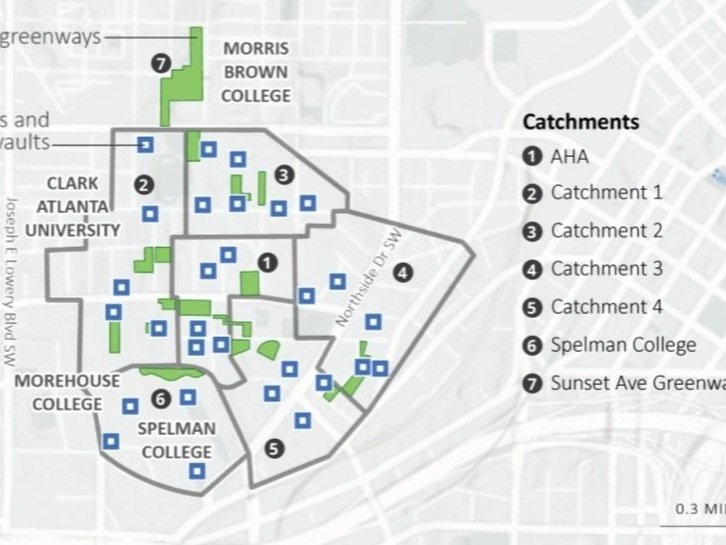Community-based organizations
APPLIED ECONOMICS TO SUPPORT RESILIENT
AND EQUITABLE COMMUNITIES
Technical Assistance for Community-Based Organizations With the generous support of the Kresge Foundation and the Ingrid Rasch Legacy Fund, Earth Economics provides pro-bono technical assistance to community-based organizations (CBOs) seeking to advance local solutions to environmental injustice, climate hazards, and the threats of displacement. We accelerate community-driven solutions by providing economic tools and data to amplify the voices and ideas of frontline communities–those first and hardest hit by climate change impacts, including low-income communities, indigenous peoples, and communities of color.
Understand and Communicate the Problem Frontline communities have the deepest knowledge of the problems they face, from flooding to air pollution to displacement risk. We can help your community to amplify and document your local knowledge with the following economic and mapping tools:
Collect community-generated data on local climate hazards and displacement
Analyze and map the disproportionate impacts of climate hazards and displacement faced by specific communities
Quantify the household-level costs of environmental hazards and displacement
Identify and Accelerate Community-Based Solutions Communities most impacted by environmental or economic challenges are best positioned to identify lasting and effective solutions to those issues. We can help accelerate community-driven, nature-based solutions in the following ways:
Quantify the economic benefits that nature-based solutions generate for community residents or local governments
Demonstrate the economic case for anti-displacement measures that sustain communities in place
Identify funding opportunities and support proposal development for community-identified projects
How We Help We provide a range of technical assistance services, including, place-based economic analyses and geospatial modeling; fact sheets and reports; and capacity-building workshops. We strive to offer support in a manner that reflects community needs and timelines. Our approach to partnership is informed by community-based participatory research principles.
The InGrid Rasch Legacy Fund
Each year, the Ingrid Rasch Legacy Fund enables Earth Economics to provide pro bono technical assistance to one non-profit or community-based organization to advance local solutions to environmental injustice, climate hazards, and the threats of displacement.
analysis and support
Deep understanding of nature-based solutions
Valuation of co-benefits and beneficiary mapping
Benefit-cost and economic impact analysis
Workshops, trainings, accessible engagement tools
Impact Updates
SOUTH BRONX UNITE:
mott haven-port morris WATERFRONT PLAN
Credit: South Bronx Unite
The Mott Haven-Port Morris Plan Waterfront Plan, developed through a community visioning process led by South Bronx Unite, aims to increase access to the local waterfront and create green spaces to improve quality-of-life, mitigate air pollution, create better health outcomes, and protect the community from flooding from coastal storms and sea level rise. Earth Economics, South Bronx Unite, and the Center for Sustainable Urban Development’s Resilient Coastal Communities Project collaborated to estimate the value of Waterfront Plan’s economic and community benefits.
GROUNDWORK HUDSON VALLEY:
GREEN INFRASTRUCTURE AND AFFORDABLE HOUSING
Credit: Groundwork Hudson Valley
Earth Economics, Groundwork USA, and Groundwork Hudson Valley have published “The Benefits of Green Infrastructure for Affordable Housing” based on the results of an ecosystem services valuation of Groundwork Hudson Valley’s Climate Safe Neighborhoods program.
Climate Safe Neighborhoods is an initiative that explores the relationship between historical race-based housing segregation and the current and predicted impacts of climate change. Under this program, Groundwork Hudson Valley has partnered with the Municipal Housing Authority for the City of Yonkers to incorporate green stormwater infrastructure at several affordable housing projects: Dr. James O’Rourke Townhouses, Francis Reagan Townhouses, Kris Kristensen Homes, Joseph F. Loehr Court, Msgr. Cajetan J. Troy Manor, and William A. Walsh Homes.
NOS QUEDAMOS:
RESILIENCE HUBS FOR DISASTER RESILIENCE
Earth Economics partnered with Nos Quedamos to analyze the potential benefits of three proposed South Bronx Resiliency Hubs, which are locally sustained, social- and built-infrastructure hybrid solutions. The fact sheet highlights the need for disaster preparedness in the Bronx through a hotspot analysis, as well as the role Nos Quedamos plays in filling that gap for the Melrose community. It also introduces the Resilience Hub concept, and explains how these hubs can reduce disaster risk by improving community preparedness and accelerating delivery of disaster and recovery benefits. The fact sheet concludes with a call for action for collaboration and support from public institutions.
ECO-ACTION:
GREEN STORMWATER INFRASTRUCTURE
Environmental Community Action, Inc. (ECO-Action) strengthens communities as they organize to confront and resolve environmental health threats. Earth Economics partnered with ECO-Action to analyze the public economic benefits of the proposed Green Infrastructure Conceptual Plans for the Atlanta University Center (AUC) area. Earth Economics valued the stormwater management benefits of 27 cisterns and three detention vaults alongside the ecosystem services benefits of 14 greenways and 656 trees.
WORLD RELIEF WESTERN WASHINGTON:
PARADISE PARKING PLOTS COMMUNITY GARDEN
The City of Kent and South King County are home to immigrant and refugee families from around the world. In response to calls for community space, World Relief Western Washington began developing the Paradise Parking Plots Community Garden in 2016, transforming a frequently flooded parking lot at Hillside Church into a vibrant multi-cultural garden oasis and resilience hub. Earth Economics assessed the ecoystem services benefits and the benefit-cost ratio of the community gardens, which provide gardeners with $127,000 in market value in foods produced each year.
Community-Driven Green Infrastructure IN NEW ORLEANS
Since 2013, the Greater Tremé Consortium (Water Wise Tremé), Healthy Community Services (Water Wise 7th Ward), and Upper 9th Ward Bunny Friend Neighborhood Association (Water Wise Upper 9th Ward), Hollygrove-Dixon Neighborhood Association, New Orleans East Green Infrastructure Collective, and the Lower 9th Ward Homeownership Association have partnered with Water Wise Gulf South to implement over 100 green infrastructure projects, including tree planting, rain gardens, rain barrels, pervious pavement, and bioswales. These projects have added more than 189,000 gallons of stormwater capacity to frequently flooded areas. The partnership addresses community concerns through education, training, and community-building events.
Sankofa Community Development Corporation:
WORKFORCE DEVELOPMENT
Sankofa Community Development Corporation (CDC) is committed to sustainable, health-centered development to revitalize New Orleans’ Lower Ninth Ward area. Their community and economic development programs address systemic problems that cause social and health disparities by building infrastructure that works with nature. This CDC requested Earth Economics’ help to measure the benefits of Sankofa’s workforce development program associated with their 40-acre Wetland Park and Nature Trail.
Nuestra Casa:
eNVIRONMENTAL JUSTICE PARENT ACADEMY
Nuestra Casa is a California-based non-profit serving East Palo Alto and its surrounding communities, building leaders who transform the local community and are actively engaged in the local economy, school district, and civic life. Earth Economics supported Nuestra Casa by providing content on ways to measure local development impacts and ecosystem services benefits of nature-based solutions for their Environmental Justice Parent Academy, which aims to ensure low-income and immigrant communities are included in discussions and policies related to climate change.
Credit: Caleb Oquendo via Pexels
ayuda legal:
DISASTER RECOVERY AND RESILIENCE
Ayuda Legal engaged Earth Economics to assess the economic impacts of Puerto Rico’s disaster recovery efforts led by the Federal Emergency Management Agency (FEMA) and the Puerto Rico Department of Housing (PRDOH). Investing in communities—especially those in or near high-risk areas—provides multiple benefits that can help break cycles of economic insecurity and vulnerability to disasters. Supporting communities and building social capital through ecological restoration develops both social networks and resources, thereby strengthening resilience and economic sustainability and providing a more cost-effective option that relocation.
DEEP SOUTH CENTER FOR ENVIRONMENTAL JUSTICE:
NATURE-BASED SOLUTIONS
The Deep South Center for Environmental Justice engaged Earth Economics to research and produce fact sheets for the five CBOs participating in the HBCU-CBO Gulf Equity Consortium. These fact sheets highlight each community’s local environmental hazards and environmental history, potential nature-based solutions, policies to address those hazards, and recommendations for local officials and community members.
FRESHWATER FUTURE:
PARTICIPATORY FLOOD MAPPING
Freshwater Future asked Earth Economics to help identify high-priority areas for green infrastructure in Detroit, by building a participatory flood mapping tool. The tool supplements data currently collected by city agencies with community-sourced knowledge, empowering residents to be part of solutions to build community resilience. Residents are now able to identify local flooding events and visualize those impacts on an interactive, web-based map.
The COMMUNITY JUSTICE PROJECT:
climate change and displacement
Credit: Steven F., yelp.com
The Community Justice Project had Earth Economics assess the household-level costs of displacement for vulnerable households of Little Haiti, a neighborhood in Miami that is facing displacement pressures tied to sea-level rise. Earth Economics produced a report and fact sheet to raise awareness of the costs of displacement.
FIFTH AVENUE COMMITTEE and Gowanus Canal Conservancy:
equitable remediation
Credit: Rob Abruzzese, brooklyneagle.com
Fifth Avenue Committee and Gowanus Canal Conservancy worked with Earth Economics to quantify the economic benefits associated with a set of planned and proposed environmental clean-up actions in Gowanus, Brooklyn, including remediation of the Gowanus Canal and new green stormwater infrastructure throughout the neighborhood. The economic analysis contributes to broader efforts to advocate for equitable investments in neighborhood improvements.
THE POINT COMMUNITY DEVELOPMENT CORPORATION:
nature-based flood reduction
Credit: Point Community Development Corporation
The Point Community Development Corporation partnered with Earth Economics to produce a fact sheet summarizing key concepts about nature-based solutions and recommendations to the City of New York as part of a larger effort to reduce flood risk. This communication tool helps community leaders to engage both residents and city officials on flood-risk reduction alternatives.
The Sewage-free Streets and Rivers Campaign: green stormwater solutions
New Jersey’s water infrastructure systems often experience stormwater overflow, referred to as Combined Sewer Overflow, which put communities at risk due to pollution and flooding. Earth Economics partnered with The Sewage-Free Streets and Rivers Campaign to look into how green Infrastructure can be part of the solution for these communities.
Staten Island Coalition for
Wetlands and Forests
Earth Economics worked with the Staten Island Coalition for Wetlands and Forests (a Anthropocene Alliance member) to quantify the value of forest and wetland losses on Staten Island. The fact sheet, “Valuing Forest and Wetland Loss on Staten Island,” shows the scale of forest and wetland losses on Staten Island but focuses on the ecosystem services lost from clearing the Graniteville wetland.

















